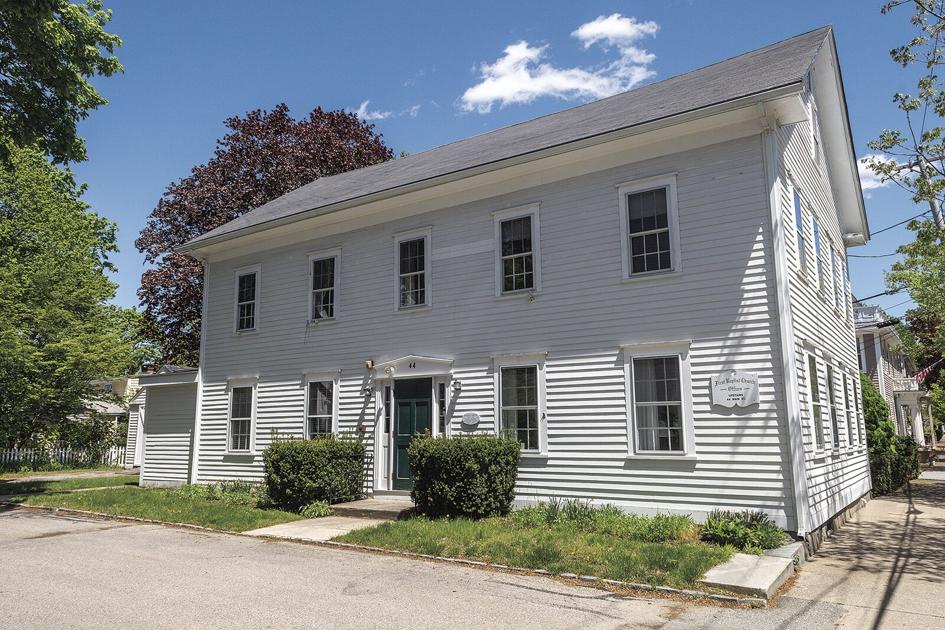
You’d look at the Wickford Baptist Church Parish House, known also as the Stafford House or Deakin House, and probably not think an awful lot about it. It’s really one of those buildings that blends into the background; nothing showy or ostentatious about it, just another 19th century building among so many others of that ilk. It’s quiet and reserved, and that’s certainly appropriate for a building that’s part of an old First Baptist parish community that’s been around for the better part of two centuries. But like so many of our fair town’s other old structures, it too has a unique story to tell — if you know how to listen.
The tale really begins in nearby Exeter at the start of the 1800s. There, in an area known locally as Lawtonville, Caleb and Alice (Albro) Lawton and their three sons, Thomas, Samuel, and Beriah, operated a textile mill that kept the locals employed and formed the core of the tiny village that existed there. Also in that same village, the Lawton family ran a store and kept an inn. Youngest son Beriah, who was elected state senator from Exeter at the age of 21, eventually moved into Wickford, where he became a prominent businessman and continued his political career as North Kingstown’s Representative for many terms. Following close behind his younger brother on the move to Wickford was Thomas. Thomas had earlier lost his wife; left a widower with four daughters to raise, he quickly got remarried to his wife’s sister Emeline (Gardiner), left the Inn and store he was running in Lawtonville — and, presumably, the painful memories attached to them — behind, and settled in Wickford.
Sometime between 1840 & 1850, on a parcel of Gardiner family land, the Lawtons constructed the big house which would eventually become the Baptist Parish House. Falling back on skills they already possessed, they opened up the Washington Hotel, perhaps taking the name from the adjacent lodge building of the Washington Chapter of the Masonic Organization. Sadly, little detail is known about how the Washington Hotel operated. Most likely it was a tavern with rooms to let, like the nearby Narragansett House, which existed across Main Street and was run by the Congdon family for decades.
The Thomas Lawton family ran the Washington Hotel until 1865, when Thomas’ unexpected death at age 61 forced changes to occur. Emeline was forced by circumstances to sell the Hotel to Seth Keach. She and her youngest daughter returned to Exeter and moved in with her oldest daughter, who had married into the Exeter line of the Brown family. She died there in 1887 and is buried in the Chestnut Hill Baptist Church graveyard, far from her husband Thomas, who rests eternal in brother Beriah’s family Plot in Elm Grove.
The Washington Hotel, however, continued on, run by Seth and Sarah Keach from 1865-1868, John Nicholas from 1868-1871, and Henry Shepard from 1871-1876. Unfortunately, in 1876 a “ruinous fire” broke out in the hotel, virtually gutting the building and, after perhaps 30 years of hospitality, changing the course of events on the ”Washington Hotel Estate” property forever.
In 1876, Civil War veteran Hugh Deakin purchased the fire-damaged hotel property and went about rebuilding it into a home for his family. So damaged by the fire that only the exterior walls were usable, Deakin virtually reconstructed the entire interior of the building, turning an inn into a home. Hugh Deakin was born in County Roscommen, Ireland in January 1840. Like so many other young men of his time, he enlisted in the army immediately after the outbreak of the Civil War and served bravely in Company H of the 4th RI Volunteers, reaching the rank of Sergeant by war’s end. He came back to the area and married Caroline Connor of the Silver Spring Mill Village. They eventually had seven children together, and obviously were able to put the big house — which now existed within the shell of the old hotel — to good use. I’m not certain exactly what Hugh Deakin’s occupation was after the War, as although on a few occasions he identified himself as a gardener, he is listed as “a notorious seller of liquid damnation” in an 1876 article most likely clipped from a Temple of Honor or other prohibition organization newsletter. That’s certainly a harsh way to describe a gardener, so I guess the jury is still out on Hugh’s stock and trade. A little mystery is always a good thing, and whatever the case, the Deakin clan prospered in spite of Hugh’s death in 1905, and stayed in the big house for generations — living there for nearly 82 years.
This brings us to 1958, a time when the Wickford Baptist Church was looking to expand and the heirs of Hugh Deakin and his wife Caroline were ready to sell the somewhat rundown home and adjacent property known locally as “Deakins’ Alley.” Things worked out well for all involved, and the Church, using money associated with the Estate of Nellie and Mary Stafford, was able to acquire the old Washington Hotel. Before long, alterations to the structure were accomplished and the building began its third life as a parish meeting place and Sunday School Building.
"Many" - Google News
May 16, 2021 at 07:00PM
https://ift.tt/3ojz3Iv
The View From Swamptown: The Lawton/Deakin house has served many roles through the years - The Independent
"Many" - Google News
https://ift.tt/2QsfYVa
Shoes Man Tutorial
Pos News Update
Meme Update
Korean Entertainment News
Japan News Update
Bagikan Berita Ini















0 Response to "The View From Swamptown: The Lawton/Deakin house has served many roles through the years - The Independent"
Post a Comment